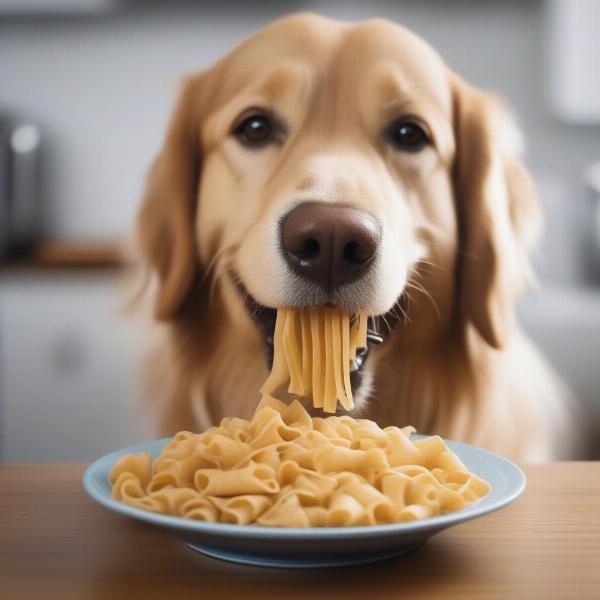Dog shaped pasta is undeniably cute. The novelty of tiny pasta paws and bones can be appealing to both dog owners and their furry friends. But before you start adding this adorable pasta to your dog’s bowl, it’s important to understand the nutritional implications and potential risks associated with feeding your dog human food, even something seemingly innocuous like pasta.
Is Dog Shaped Pasta Safe for Dogs?
Plain, cooked pasta, like the dog shaped variety, is generally safe for dogs in small quantities. However, it’s crucial to remember that pasta is primarily carbohydrates and lacks essential nutrients that dogs require for a balanced diet. While a few pieces won’t harm your dog, it shouldn’t become a regular part of their diet. Think of it as an occasional treat, not a meal replacement.
 Dog happily eating dog shaped pasta from a bowl
Dog happily eating dog shaped pasta from a bowl
The Nutritional Value (or Lack Thereof) of Pasta for Dogs
While harmless in moderation, dog shaped pasta doesn’t offer much in terms of nutritional value for your canine companion. It’s primarily made of wheat flour, which provides carbohydrates for energy but lacks the essential proteins, fats, vitamins, and minerals that dogs need to thrive. A diet consistently high in carbohydrates can lead to weight gain and other health problems in dogs, just like in humans.
Potential Risks of Feeding Your Dog Pasta
While plain cooked pasta is generally safe, there are potential risks to consider:
- Wheat Allergies: Some dogs are allergic to wheat. If your dog experiences vomiting, diarrhea, itchy skin, or ear infections after consuming wheat-based products, they may have a wheat allergy.
- Choking Hazard: Small, uncooked pasta pieces can pose a choking hazard, especially for smaller breeds. Ensure the pasta is cooked thoroughly and soft before offering it to your dog.
- Added Ingredients: Avoid flavored pasta or pasta dishes with sauces, as these can contain ingredients that are toxic to dogs, such as garlic, onions, and xylitol.
Healthy Alternatives to Dog Shaped Pasta
Instead of dog shaped pasta, consider healthier treats that offer more nutritional value:
- Fruits and Vegetables: Carrots, apples (without the core and seeds), blueberries, and bananas are healthy and delicious options for dogs.
- Commercial Dog Treats: Choose high-quality treats specifically formulated for dogs, ensuring they meet nutritional standards.
- Homemade Dog Treats: You can easily make healthy and delicious treats at home using dog-friendly ingredients.
Can Puppies Eat Dog Shaped Pasta?
Puppies have specific dietary needs for growth and development. While a tiny bit of plain cooked dog shaped pasta won’t harm them, it’s best to focus on providing them with a complete and balanced puppy food formulated to meet their nutritional requirements.
Conclusion
Dog shaped pasta can be a fun, occasional treat for your dog, but it shouldn’t replace a balanced diet. Always prioritize feeding your dog a complete and nutritious dog food. If you have any concerns about your dog’s diet, consult with your veterinarian.
FAQ
- Can dogs eat raw pasta? No, uncooked pasta can be difficult for dogs to digest and may pose a choking hazard.
- What should I do if my dog eats a large amount of pasta? Monitor your dog for any signs of digestive upset, such as vomiting or diarrhea. If they exhibit any unusual symptoms, contact your veterinarian.
- Are there any other types of pasta that are safe for dogs? Similar to dog shaped pasta, other plain cooked pasta types are generally safe in small quantities, but they don’t offer significant nutritional benefits.
- Can I add sauce to my dog’s pasta? No, many sauces contain ingredients that are toxic to dogs, such as garlic, onions, and xylitol.
- What are some good alternatives to pasta for dog treats? Fruits, vegetables, and commercial or homemade dog treats are healthier options.
- Is dog shaped pasta a good training treat? While it can be used occasionally, it’s best to use smaller, healthier treats for training to avoid overfeeding.
- Can senior dogs eat dog shaped pasta? Senior dogs may have more sensitive digestive systems, so it’s best to offer them pasta in very small quantities or avoid it altogether.
ILM Dog is a leading international dog care website dedicated to providing expert advice on all aspects of dog ownership, from breed selection and puppy care to senior dog health and training. Whether you’re a new dog owner or a seasoned expert, we offer reliable, practical information to help you provide the best possible care for your furry friend. Our areas of expertise include Breed Selection, Health & Medical Care, Training & Behavior, Nutrition & Feeding, Grooming & Hygiene, and Products & Accessories. For professional advice and personalized guidance, contact us at [email protected] or +44 20-3965-8624. Visit ILM Dog for more information.